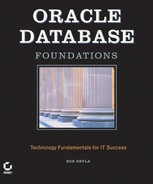A.12. Chapter 12
What GUI tool analyzes a SQL statement and identifies the steps used to process the query?
Answer: The Explain Plan GUI tool analyzes a SQL statement and identifies the steps used to process the query.
The two general categories of indexes are ________ indexes and _________ indexes.
Answer: B-tree, bitmap
Which type of index is best for columns with a low cardinality?
Answer: A bitmap index is best for columns with a low cardinality.
Which dynamic performance view can assist the DBA in sizing the buffer cache appropriately?
Answer: The dynamic performance view V$DB_CACHE_ADVICE can assist the DBA in sizing the buffer cache appropriately.
Which type of table divides the contents of a very large table into more manageable chunks, both improving the manageability of the table for the DBA and potentially increasing the performance of queries on the table?
Answer: A partitioned table divides the contents of a very large table into more manageable chunks.
Which data dictionary views contain information about table indexes and the table columns indexed?
Answer: The data dictionary views DBA_INDEXES and DBA_IND_COLUMNS contain information about table indexes and the table columns indexed.
Name the six steps in Oracle's Tuning Methodology in order of priority.
Answer: The six steps in Oracle's Tuning Methodology are data design, application design, memory allocation, I/O and physical structures, resource contention, and underlying platform.
Which feature associated with materialized views rewrites a query to use the materialized view instead of using the tables that are the source for the materialized view?
Answer: The QUERY REWRITE feature rewrites a query to use the materialized view instead of using the tables that are the source for the materialized view.
What is the name of the pseudo-column that exists for every row of every table in the database and is unique across the entire database?
Answer: The pseudo-column ROWID exists for every row of every table in the database and is unique across the entire database.
Name the two different optimizer modes in Oracle9i and identify which one uses statistics from tables and indexes to derive an execution plan; identify two of the most common modes in Oracle 10g.
Answer: The two different optimizer modes for Oracle9i are rule-based and cost-based. The cost-based method uses statistics from tables and indexes to derive an execution plan. For Oracle 10g, the two most common optimizer modes are ALL_ROWS and FIRST_ROWS.
